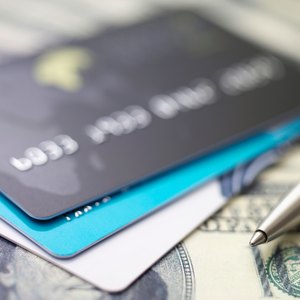
One of the advantages and drawbacks of using a credit card is that it creates a paper trail. This makes it possible for your credit card issuer to send you a bill for the charges you make. It also lets the issuer see where someone who stole your credit card used it, potentially making it easier to catch that person.
Tips
Credit card companies can track where your stolen credit card was last used, in most cases, only once the card is used by the person who took it. The credit card authorization process helps bank's track this. However, by the time law enforcement arrives, the person may be long gone.
Credit Card Authorizations
The credit card authorization process creates an opportunity for tracking. When you, or a card thief, hands your card to a store clerk, he uses a card reader to send its information to a card processing company. That company checks with your credit card company to make sure that your card is good and that it has enough money to cover the charge. If it does, the charge gets approved and you – or the crook – get the stuff. Along the way, information on the store, its location and the amount charged gets passed through to your credit card issuer. This way, it knows where the card got used and can build a history.
"Tracking" Card Users
While your bank can track stolen cards, the tracking isn't perfect. It can generally only track the card if it gets used. Also, since people usually pay when they are on their way out of a retail establishment, it's reasonable to expect that they would be gone by the time that law enforcement could arrive. On the other hand, stores and card issuers can also use transaction information to pinpoint the exact time the stolen card was used and find video footage of the person from the store's surveillance system.
How Cards Get Stolen
Card thieves don't have to take your card to steal it. They can use the carbon copies that were part of the paper slips used to capture physical card imprints, too. At restaurants, waiters would write down the information on your card while running it for you. Now, theft has gone digital. Waiters can use small card-skimming devices in their aprons, thieves can attach readers to gas pumps and larger-scale cyber criminals can steal credit card numbers by the millions by hacking into corporate databases.
Card Theft and You
If your card gets stolen, it shouldn't matter to you whether or not authorities ever ever catch the thief. Under federal law, your liability for fraudulent charges is capped at $50 as long as you promptly report the theft, and, if your card number is stolen or you report the theft before your card gets used, you have no liability. Some card issuers might give you even more protection than this, too.
References
- KSLA: SPD -- Credit Card Thieves Caught on Camera
- Bankrate: Five Ways Thieves Steal Credit Card Data
- Federal Trade Commission: Lost or Stolen Credit, ATM, and Debit Cards
- Federal Trade Commission. "Warning Signs of Identity Theft." Accessed March 17, 2020.
- Federal Trade Commission. "Equifax Data Breach Settlement." Accessed March 17, 2020.
- Federal Bureau of Investigation. "Scams and Safety—Skimming." Accessed March 17, 2020.
- Federal Trade Commission. "Tips for Using Public Wi-Fi Networks." Accessed March 17, 2020.
- Federal Trade Commission. "How to Spot, Avoid and Report Tech Support Scams." Accessed March 17, 2020.
- Federal Trade Commission. "How to Recognize and Avoid Phishing Scams." Accessed March 17, 2020.
- Federal Trade Commission. "Protecting Against Credit Card Fraud." Accessed March 17, 2020.
- Federal Trade Commission. "The Dark Web: What Your Business Needs to Know." Accessed March 17, 2020.
- Federal Bureau of Investigation. "Credit Card Cloners Stole Thousands." Accessed March 17, 2020.
- Federal Trade Commission. "Lost or Stolen Credit, ATM, and Debit Cards." Accessed March 17, 2020.
- Discover. "Report Lost or Stolen Card." Accessed March 17, 2020.
- Capital One. "I Need a Replacement Credit Card." Accessed March 17, 2020.
- Federal Trade Commission. "How to Keep Your Personal Information Secure." Accessed March 17, 2020.
Writer Bio
Steve Lander has been a writer since 1996, with experience in the fields of financial services, real estate and technology. His work has appeared in trade publications such as the "Minnesota Real Estate Journal" and "Minnesota Multi-Housing Association Advocate." Lander holds a Bachelor of Arts in political science from Columbia University.

